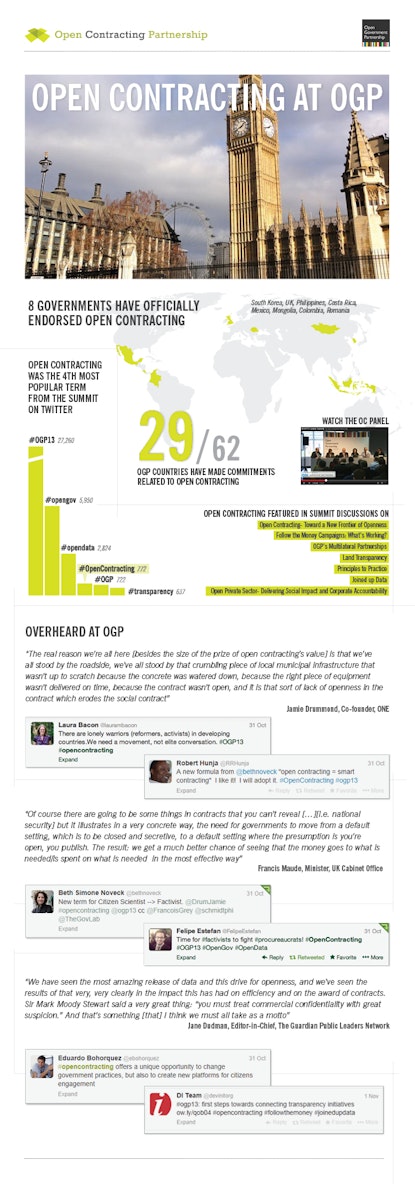Open Contracting: Factivists fighting Procureaucrats

The recent Open Government Partnership Summit drew over 1000 experts and practitioners from the field of Open Government to London for an important opportunity to celebrate advances that have been made and to push for further innovation. One of the key topics that emerged over the two-day summit was open contracting, which refers to norms and practices for increased disclosure and participation at all stages of public contracting.
It has been estimated that governments spend an average of $9.5 trillion every year through contracts. But contracting information is often not available for the public to scrutinize. There is enormous potential for increased openness in contracting to stem the problems that arise from corruption and mismanagement of public resources. Especially in the wake of the global financial crisis where there is increased pressure to account for use of scarce resources, there is a growing need for more open contracting.
Contracts are at the nexus of revenue generation, budget planning, resource management and delivery of public goods. While there are a number of existing initiatives that seek to transform each of those areas, Open Contracting is increasingly being seen as a silo buster. As Laura Bacon of the Omidyar Network said her in her post on the OGP blog before the summit, open contracting is a “game changer”
During the Summit, there were many conversations that featured open contracting, including a high-level panel with UK Cabinet Minister Francis Maude, Beth Noveck of GovLab, Jamie Drummond from ONE, Jane Dudman from the Guardian, Minister Olivas of Mexico, and Sanjay Pradhan of the World Bank.
As Drummond said, “The real reason we’re all here… is that we’ve all stood by the roadside, we’ve all stood by that crumbling piece of local municipal infrastructure that wasn’t up to scratch because the concrete was watered down, because the right piece of equipment wasn’t delivered on time, because the contract wasn’t open, and it is that sort of lack of openness in the contract which erodes the social contract.”
There is an emerging group of “warriors,” as Pradhan calls them, who are coming together to work towards more open contracting for the betterment of their communities, their countries, and people all around the world.
These “warriors” are increasingly armed with facts. Jamie Drummond called for global network of informed citizens, or “factivists”
Factivists, he says, are smart people with smartphones–a global network of informed citizens who are helping reformers within government, and hassling obfuscators in the private sector and government to open contracting.
One thing that emerged from the panel discussion is that it is the job of these factivists, to engage with those who Minister Maude called “procureaucrats”, or people who do procurement, who typically are running a process rather than seeking an outcome. Through this engagement, procureaucrats can truly benefit from more open contracting processes as they will allow them to focus more on the “what” and less on the “how”, and enable them to really know what the possibilities are.
“Governments need to move from a default setting of being closed and secretive, to a default setting where the presumption is, you’re open”, said Minister Maude.
Factivists and procureaucrats alike are increasingly becoming a part of this open contracting movement which is quickly gaining momentum. As the fourth most popular term on twitter to come out of the summit, it is clear that an increasing number of people are recognizing the transformative power of open contracting, and the impact it can have on the everyday lives of citizens all around the world.
This “ecosystem of collaborators” as Beth Noveck described it, is key to the success of the movement. By joining up with governments, civil society and the private sector, where she mentioned open contracting practices are taking place under the name ‘smart contracting’, we will begin to see even more change on the ground and better, more open development.